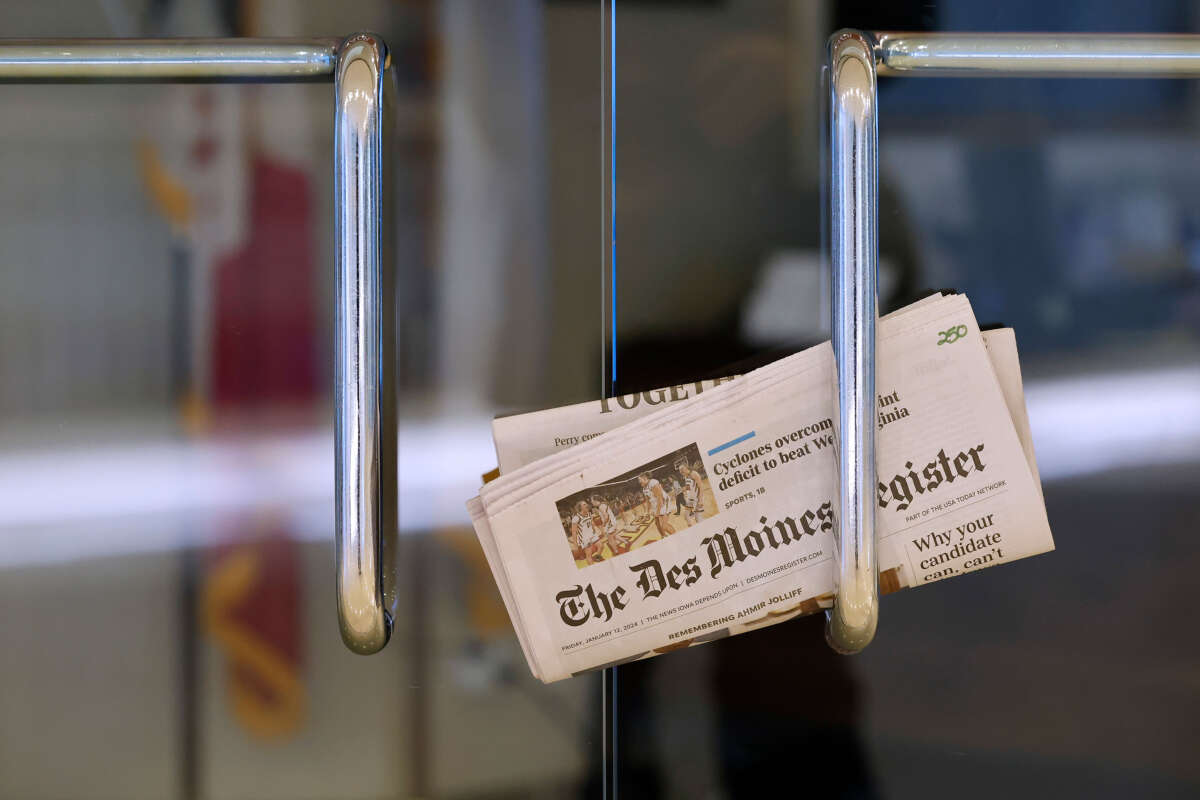Did you know that Truthout is a nonprofit and independently funded by readers like you? If you value what we do, please support our work with a donation.
President-elect Donald Trump is suing a well-respected pollster and the newspaper that has published her polls, alleging that a survey she conducted during the 2024 presidential election amounted to “interference” in the race.
The lawsuit, filed on Monday night, targets pollster Ann Selzer, The Des Moines Register (where her poll has been published for years) and the paper’s parent company, Gannett. The suit states that it is seeking “accountability for brazen election interference” and claims that the pollster and the paper engaged in “election-interfering fiction” in publishing an outlier poll days before the election took place.
“Defendants and their cohorts in the Democrat [sic] Party hoped that the [Kamala] Harris Poll would create a false narrative of inevitability for Harris in the final week of the 2024 Presidential Election,” the lawsuit alleges.
Trump’s legal team purports that Selzer, the paper and Gannett violated the state-based Consumer Fraud Act, which forbids misrepresentations “in connection with the advertisement, sale or lease of consumer merchandise or the solicitation of contributions for charitable purposes.”
There appears to be no evidence substantiating the Trump legal team’s claims. A spokesperson from The Des Moines Register said the paper “stand[s] by our reporting on the matter and believe this lawsuit is without merit.”
Polling is not a perfect science, and outliers are always a possibility. If a poll has a margin of error of five percentage points, for example, it means that either Candidate A’s or Candidate B’s numbers could fluctuate in either direction up to that number. Polls also have a stated confidence level, generally around 95 percent, which means that, 19 out of 20 times a poll is replicated, a pollster can expect the same results. However, 1 in 20 times, the poll may be completely off.
Polls are also snapshots of what voters are feeling at the moment, and it is possible for voters to change their views between when the poll is conducted and the date of the election.
Selzer’s polls have generally been well-regarded, and she accurately predicted Trump winning the state of Iowa in both 2016 and in 2020. Her poll for this year’s election made headlines because Iowa had been viewed as a “safe” state for Trump throughout the campaign.
The Des Moines Register poll, which Selzer managed, predicted a 3-point margin for Harris to defeat Trump. The prediction was inside the 3.4 point margin of error.
As it turned out, Selzer was way off — Trump won the state by around 12 points.
In an interview with PBS this week, Selzer said she was “mystified” by Trump and others claiming she would manipulate polling data to somehow interfere with the presidential race.
The allegations come “without a single shred of evidence that I was in cahoots with somebody, I was being paid by somebody” to alter polling results, she said.
“It’s hard to pay too much attention to it except that they’re accusing me of a crime,” she added.
Trump’s lawsuit against Selzer and The Des Moines Register comes on the heels of his legal win in a lawsuit against another news organization.
Trump had filed a lawsuit against ABC News, alleging that host George Stephanopoulos had defamed him during his 2024 campaign by saying that he was found liable for rape in a civil lawsuit brought forward by writer E. Jean Carroll. In actuality, a jury had found Trump liable for committing sexual abuse (although a judge in that case did note that Trump’s actions were similar to how people “commonly understand” the definition of rape).
For a lawsuit by a public figure like Trump to be successful, it must be proven that a statement was made with “actual malice” intended to hurt someone’s reputation. A proper defense by Stephanopoulos and ABC News could have relied on that standard, suggesting that Stephanopoulos had merely misspoken or mistakenly taken the judge’s words out of context.
However, Disney, the parent company of ABC News, decided this month to settle the matter out of court, agreeing to pay $15 million toward Trump’s presidential library, and having Stephanopoulos make a public apology. According to a report published on Wednesday by The New York Times, Disney made the decision based on worries about damaging its brand (and potential boycotts by conservatives) and concerns about a lengthy appeals process. The company also feared that the matter could make its way up to the U.S. Supreme Court, where a Trump-friendly bench could amend or even overturn the “actual malice” standard.
ABC News employees are reportedly deeply upset about Disney’s decision. “It’s sheer level embarrassment. People are furious,” one employee said.
Media critics also said that Disney’s action made it easier for Trump to go after other news organizations — just as he’s doing now with The Des Moines Register.
“ABC News has opened the floodgates for a newly-emboldened Trump to wage war against everyone in the media he doesn’t like,” political commentator Brian Tyler Cohen said. “They have made the entire media ecosystem less safe, and ushered us one step closer to the very brand of illiberal democracy that Trump has threatened for so long.”
Writer and activist Amy Siskin also blamed Disney for the outcome of the lawsuit against The Des Moines Register.
“This is what ABC News has done — emboldened Trump,” Siskind said.
Media that fights fascism
Truthout is funded almost entirely by readers — that’s why we can speak truth to power and cut against the mainstream narrative. But independent journalists at Truthout face mounting political repression under Trump.
We rely on your support to survive McCarthyist censorship. Please make a tax-deductible one-time or monthly donation.
